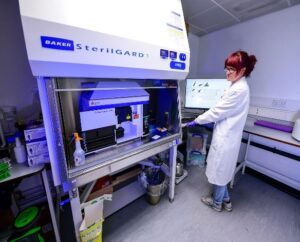Tales of a Technician at the Institute of Genetics and Cancer: Lizzie Freyer
 Separating green from red, and dead from live, she works miracles with our low in number, debris-filled, clumpy cell samples. She brings light and energy to a darker and windowless basement space and is a friendly face when failed experiments get us down. We all know that our flow cytometry facility wouldn’t run the same without her, but what do we actually know about Lizzie’s journey to becoming our flow facility manager? As a much-loved member of our technical staff, I was keen to shine a light on Lizzie’s day-to-day role and some of the pivotal moments in her career which led her here to work with us at the IGC.
Separating green from red, and dead from live, she works miracles with our low in number, debris-filled, clumpy cell samples. She brings light and energy to a darker and windowless basement space and is a friendly face when failed experiments get us down. We all know that our flow cytometry facility wouldn’t run the same without her, but what do we actually know about Lizzie’s journey to becoming our flow facility manager? As a much-loved member of our technical staff, I was keen to shine a light on Lizzie’s day-to-day role and some of the pivotal moments in her career which led her here to work with us at the IGC.
Beginning in Germany, where she grew up, Lizzie’s evident interest in biotech became apparent as she completed an undergraduate degree as an Engineer of Biotechnology. It was during this undergraduate experience that an exciting opportunity arose for a one-year stint in the haematology department in Seattle. More importantly to the Lizzie that we all know, Seattle would be where she would get the opportunity to combine molecular methods with flow cytometry.
Fortunately for us, it was Lizzie’s next job that brought her to Edinburgh and within proximity of the IGC, where she took a position at Little France to work as a flow cytometry technician. Little France was not where she would stay however, as just 1 year and a half later, the IGC adopted Lizzie for the newly opened flow cytometry facility in 2008 (& the rest is history as they say!). She may have had a flavour of flow cytometry in Germany, the U.S., and France (the little kind), but it was the IGC Fortessa, Aria, and Jazz that won her over in the end. Lizzie reflects upon her role, “I have found the right place for me, being part of the research but not being a researcher directly”, “I enjoy the supportive role”.
Whether wanting to measure fluorescent signal after drug treatment or desiring single mCherry +ve cells in a plate for sequencing, Lizzie (& her FACS machines) can certainly show you the way. Support is her greatest strength, as she and her team spend their working hours supporting people at the IGC in their research by making technology available and user friendly. Many of us, including myself, could share the numerous times she has offered advice about how we can incorporate technology into our research projects. And if the first method doesn’t work so well, she is always happy to discuss and test out alternative approaches to ensure that we all get the most from our data. I spent many an hour down in that basement during my master’s waiting patiently as GFP +ve cells entered the machine one by one, tube, by tube, by tube, by tube, by tube… Upon conversations with, and advice from Lizzie, it was not long before we had a more efficient and practical plate-based approach in motion! And I am pretty sure that there are plenty more stories where that came from. Lizzie describes how she is “always happy when someone walks out and realises that it [flow cytometry] wasn’t as daunting as they thought it was going to be” and she feels a responsibility to “make it a little less scary” for users. Nevertheless, we also have a responsibility, and having an “idea of what they would like to get out of their experiments” and arriving “prepared” are two things which Lizzie considers important for a smooth and fruitful visit to the facility (so be warned!).
Finally, I asked Lizzie what she enjoys most about working at the IGC…she answered, “the 1:1 work with people” and “providing a little bit of help to allow people to advance their research”. Overall, “when people get good data it makes me happy”, and good data certainly makes us happy too so thank you, Lizzie!



